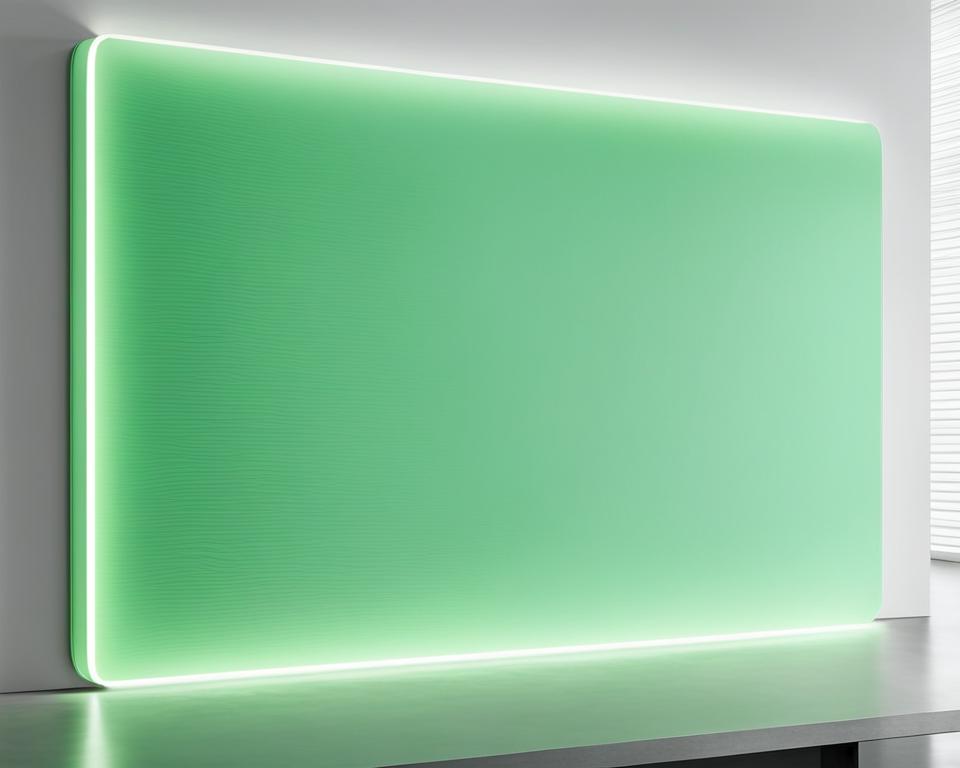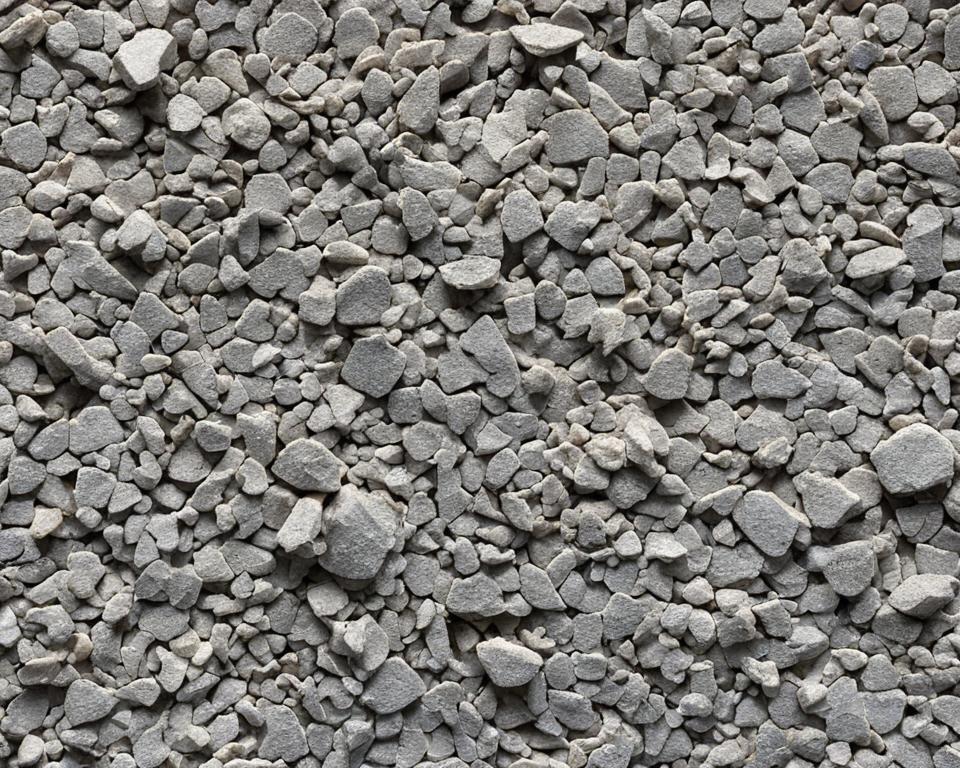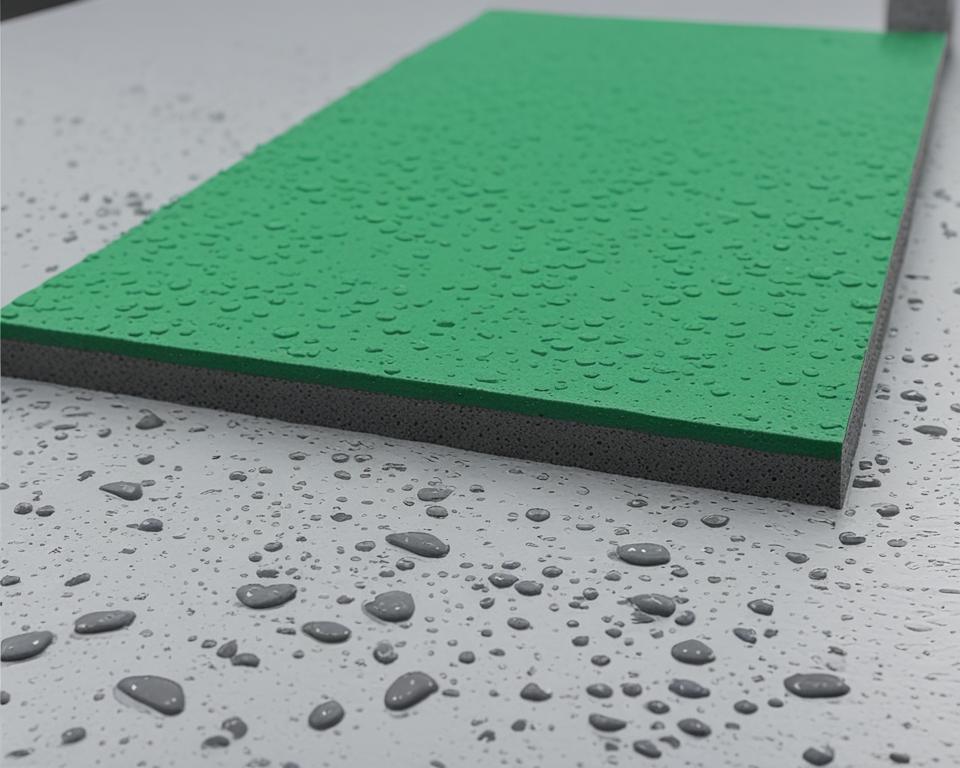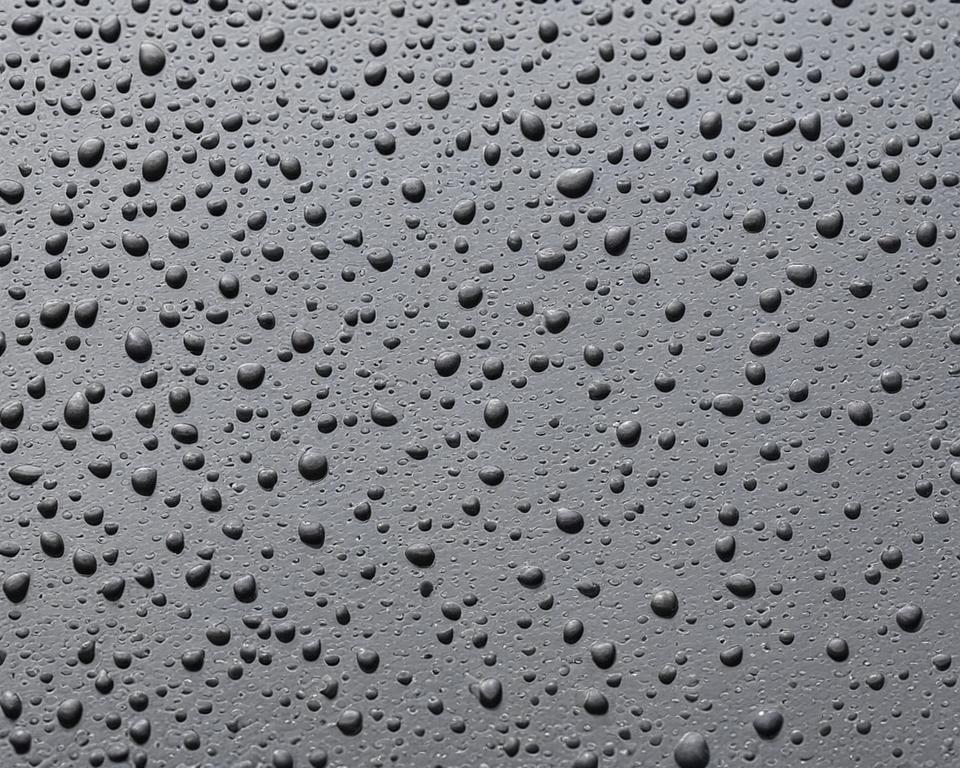When it comes to choosing the best material for bathroom walls and other wet areas, it’s important to consider both durability and moisture resistance. Two popular options that often come up in this discussion are greenboard and cement board. In this article, we will compare greenboard vs cement board to help you make an informed decision for your next renovation project.
Key Takeaways
- Cement board is a durable and moisture-resistant choice for wet areas.
- Greenboard, also known as moisture-resistant drywall, is not approved for residential wet areas.
- Greenboard is best suited for areas with low humidity levels.
- Cement board is waterproof and can withstand continuous water exposure.
- For superior performance and long-lasting protection against moisture, cement board is the best choice.
What is Greenboard?
Greenboard, also known as moisture-resistant drywall, is a type of drywall that is designed to withstand damp conditions. It is commonly used in areas with low humidity levels, such as kitchens, basements, and some bathtub enclosures.
Greenboard has a thicker paper coating than regular drywall, with a wax covering that provides water resistance. This makes it more resistant to moisture compared to standard drywall.
However, it is important to note that greenboard is not mold-resistant. While it can withstand some moisture, it is not suitable for areas with high humidity or continuous exposure to water.
Advantages of Greenboard:
- Offers moisture resistance
- Can be used in areas with low humidity levels
- More affordable than some other moisture-resistant options
Despite its advantages, it is crucial to consider the limitations of greenboard. It is not recommended for use in showers or other wet areas where continuous moisture exposure is expected.
Greenboard is a suitable choice for low humidity areas such as kitchens and basements, where occasional moisture may be present, but it is not the best option for areas prone to high humidity or extensive water contact.
When considering the best material for bathroom walls, it is important to weigh the advantages and disadvantages of greenboard against other options, such as cement board.

What is Cement Board?
Cement board, also known as cementitious backer board, is an essential material for wet areas such as showers and bathroom walls. It is a strong and moisture-resistant option that offers long-lasting durability and protection against water damage. Cement board is made from a mixture of cement and fiberglass mesh, creating a sturdy and stable surface that can withstand continuous contact with water.
Unlike greenboard, which is moisture-resistant but not waterproof, cement board provides an extra layer of security in wet environments. Its waterproof properties make it an ideal choice for areas prone to moisture, preventing the growth of mold and mildew.
Cement board is available in various brands such as Durock, Wonderboard, and Permabase. Each brand may have slight differences in terms of thickness and installation methods, but they all offer the same core benefits of strength, moisture resistance, and durability.
Whether you’re renovating your bathroom or building a new shower, cement board is a reliable option that ensures the longevity and integrity of your wet areas.
| Advantages of Cement Board | |
|---|---|
| Advantage | Explanation |
| Waterproof | Cement board is resistant to water and can withstand continuous contact without deteriorating. |
| Moisture resistance | The combination of cement and fiberglass mesh provides excellent resistance to moisture, preventing the growth of mold and mildew. |
| Durability | Cement board is a strong and stable material that can withstand the test of time, ensuring the longevity of your wet areas. |
| Reliable protection | By using cement board, you can confidently protect your walls and showers from water damage and related issues. |
When it comes to choosing the best material for your wet areas, cement board is the superior option. Its waterproof nature, moisture resistance, and durability make it a reliable choice that can withstand the demands of showers and bathroom walls.

Comparison between Greenboard and Cement Board
When comparing greenboard vs cement board, it is important to consider their characteristics and suitability for wet areas. Greenboard offers moisture resistance but is not waterproof and is not approved for residential wet areas. On the other hand, cement board is waterproof and can withstand continuous water exposure. It is a more durable and reliable option for areas prone to moisture, such as showers and bathroom walls.
To better understand the differences between greenboard and cement board, let’s take a closer look at their key features:
Greenboard:
- Provides moisture resistance
- Not waterproof
- Not approved for residential wet areas
- Best suited for areas with low humidity levels, such as kitchens, basements, and some bathtub enclosures
Cement Board:
- Offers waterproof properties
- Can withstand continuous water exposure without deteriorating
- Commonly used in showers and other wet areas
- Durable and reliable option for areas prone to moisture
“Greenboard offers moisture resistance but is not waterproof, making it unsuitable for residential wet areas. On the other hand, cement board is a waterproof and durable option that can withstand continuous water exposure.”
From the comparison between greenboard vs cement board, it is evident that cement board is the superior choice for wet areas. Its waterproof properties and ability to withstand moisture make it ideal for shower walls and bathroom installations. While greenboard may have some advantages, it is not approved for wet areas and may not provide adequate protection against moisture.

When it comes to selecting the best material for bathroom walls and other wet areas, cement board is the recommended option for its durability and moisture resistance. Consider using cement board for your next renovation or upgrade project to ensure long-lasting and reliable results.
Advantages of Greenboard
While greenboard is no longer recommended for wet areas, it does have some advantages. Here are the key benefits of using greenboard:
- Ease of installation: Greenboard is easy to install, making it a convenient choice for DIY enthusiasts and contractors alike. Its lightweight nature and straightforward installation process save time and effort during the construction or renovation of walls.
- Affordability: Compared to cement board, greenboard is more budget-friendly. This cost-effective option allows homeowners to achieve the desired results without breaking the bank.
- Availability: Greenboard is readily available in most home improvement stores, making it easily accessible for anyone planning a project. Its wide availability ensures that you won’t have to search far and wide to find the materials you need.
It is important to note, however, that greenboard is not mold-resistant and may not provide adequate protection against moisture in high humidity areas. Therefore, it is crucial to consider the specific requirements and conditions of your project when weighing the advantages of greenboard.
Now that we have explored the advantages of greenboard, it is equally crucial to understand the benefits of cement board. Let’s delve into the advantages of using cement board in wet areas in the next section.
Advantages of Cement Board
Cement board has numerous advantages over greenboard, making it the preferred choice for wet areas such as showers and bathroom walls. Its superior performance and durability make it a reliable and long-lasting solution.
- Waterproof: One of the most significant advantages of cement board is its waterproof property. It can withstand continuous water exposure without deteriorating, providing a high level of protection against moisture.
- Durability: Cement board is known for its durability and strength. It is resistant to damage, making it highly suitable for areas that are prone to wear and tear.
- Mold and Mildew Resistance: Cement board is inherently resistant to mold and mildew growth. This is important for wet areas where moisture levels are high, as it helps prevent the growth of harmful bacteria and maintains a hygienic environment.
“Cement board offers superior waterproofing, durability, and resistance to mold and mildew, making it the ideal choice for wet areas.”
While cement board may require slightly more effort during installation and could be slightly more expensive than greenboard, these factors are outweighed by its long-term benefits and performance. Its ability to withstand continuous water exposure, coupled with its superior durability, makes it a preferred option for wet areas.
Overall, the advantages of cement board, including its waterproof nature, durability, and resistance to mold and mildew, make it the preferred choice for wet areas. Its long-lasting performance ensures a reliable solution for your bathroom walls and showers, offering peace of mind and protection against moisture-related issues.
Best Choice for Wet Areas: Cement Board
When it comes to creating wet areas like showers and bathroom walls, choosing the right material is crucial. For the best combination of durability and moisture resistance, cement board is the recommended choice. With its waterproof properties and ability to withstand high moisture levels, cement board is ideal for wet areas that require long-lasting protection.
Unlike traditional greenboard, which was once a popular option, cement board offers superior strength and resistance to mold and mildew. Greenboard, while moisture-resistant, is not approved for use in residential wet areas. Cement board, on the other hand, provides a reliable solution that can withstand continuous water exposure without deteriorating.
With cement board, you can have peace of mind knowing that your bathroom walls and shower surfaces are well-protected against moisture damage. Whether you’re renovating your bathroom or building a new one, cement board is the best choice for ensuring the longevity and performance of your wet areas.
Advantages of Cement Board:
- Waterproof: Cement board is impervious to water, making it an excellent choice for wet areas.
- Durable: With its strong composition, cement board is built to last and withstand the test of time.
- Resistance to Mold and Mildew: Unlike greenboard, which is prone to mold growth, cement board offers superior protection against mold and mildew.
- Reliable: Cement board provides a reliable solution for wet areas, ensuring the long-term integrity of your bathroom walls and showers.
When it comes to the best material for bathroom walls and wet areas, cement board stands out as the top choice. Its exceptional waterproof properties, durability, and resistance to mold and mildew make it the optimal solution for creating a bathroom environment that will withstand the test of time.
With cement board, you can have peace of mind knowing that your bathroom walls and shower surfaces are well-protected against moisture damage. Its reliable performance and longevity make it the best choice for wet areas. Upgrade your bathroom with cement board for a durable and moisture-resistant solution that will exceed your expectations.
Conclusion
In conclusion, when comparing greenboard vs cement board for wet areas, cement board emerges as the clear winner. Its waterproof, durable, and mold-resistant properties make it an ideal choice for areas exposed to moisture. On the other hand, greenboard, despite its advantages, is not approved for residential wet areas and may not provide sufficient protection against moisture infiltration.
When it comes to creating moisture-resistant wallboard, cement backing boards like Durock, Wonderboard, and Permabase offer a reliable and long-lasting solution. These cement boards not only withstand continuous water exposure but also prevent the growth of mold and mildew, ensuring a healthier environment.
If you’re considering a renovation or upgrade project for your bathroom walls or other wet areas, we highly recommend choosing cement board as the go-to material. Its superior performance and resistance to water damage make it the best choice for ensuring the longevity and durability of your walls. Invest in cement board for a moisture-resistant wallboard solution that you can count on.
FAQ
What is Greenboard?
Greenboard, also known as moisture-resistant drywall, is a type of drywall that is designed to withstand damp conditions. It has a thicker paper coating with a wax covering for water resistance. However, it is important to note that greenboard is not mold-resistant. It is best suited for areas with low humidity levels, such as kitchens, basements, and some bathtub enclosures.
What is Cement Board?
Cement board, also known as cementitious backer board, is a type of board made from a mixture of cement and fiberglass mesh. It is a sturdy and moisture-resistant option that is commonly used in showers and other wet areas. Unlike greenboard, cement board is waterproof and can withstand continuous contact with water. It is available in various brands such as Durock, Wonderboard, and Permabase.
What is the difference between Greenboard and Cement Board?
Greenboard is moisture-resistant drywall that is not mold-resistant and is best suited for low humidity areas. Cement board, on the other hand, is a waterproof and durable option that can withstand continuous water exposure. It is a recommended choice for wet areas like showers and bathroom walls.
What are the advantages of Greenboard?
Greenboard is easy to install and more affordable than cement board. It is readily available and can be used in areas with low humidity levels, such as kitchens and basements. However, it is important to note that greenboard is not mold-resistant and may not provide adequate protection against moisture in high humidity areas.
What are the advantages of Cement Board?
Cement board is waterproof, durable, and resistant to mold and mildew. It provides a reliable and long-lasting solution for wet areas such as showers and bathroom walls. While cement board may be slightly more expensive and harder to install than greenboard, its superior performance and durability make it a preferred choice for wet areas.
Which is the best choice for wet areas?
When it comes to wet areas like showers and bathroom walls, cement board is the recommended choice. Its waterproof properties and resistance to mold and mildew make it ideal for areas with high moisture levels. While greenboard may be suitable for low humidity areas, it is not approved for residential wet areas and does not offer the same level of protection as cement board. For a durable and moisture-resistant upgrade, cement board is the best choice.
